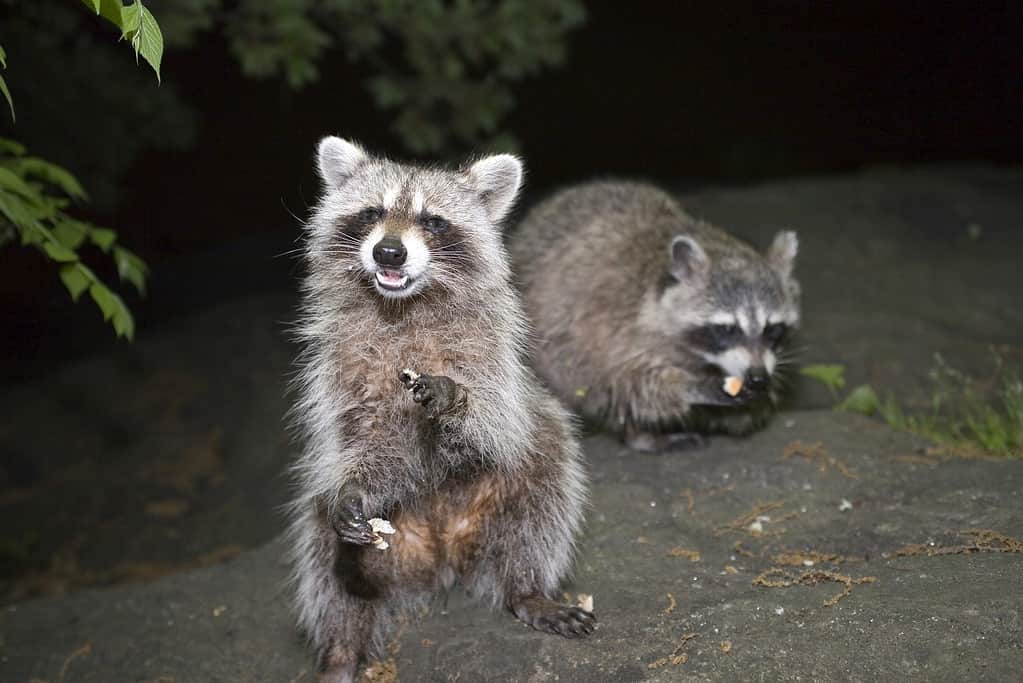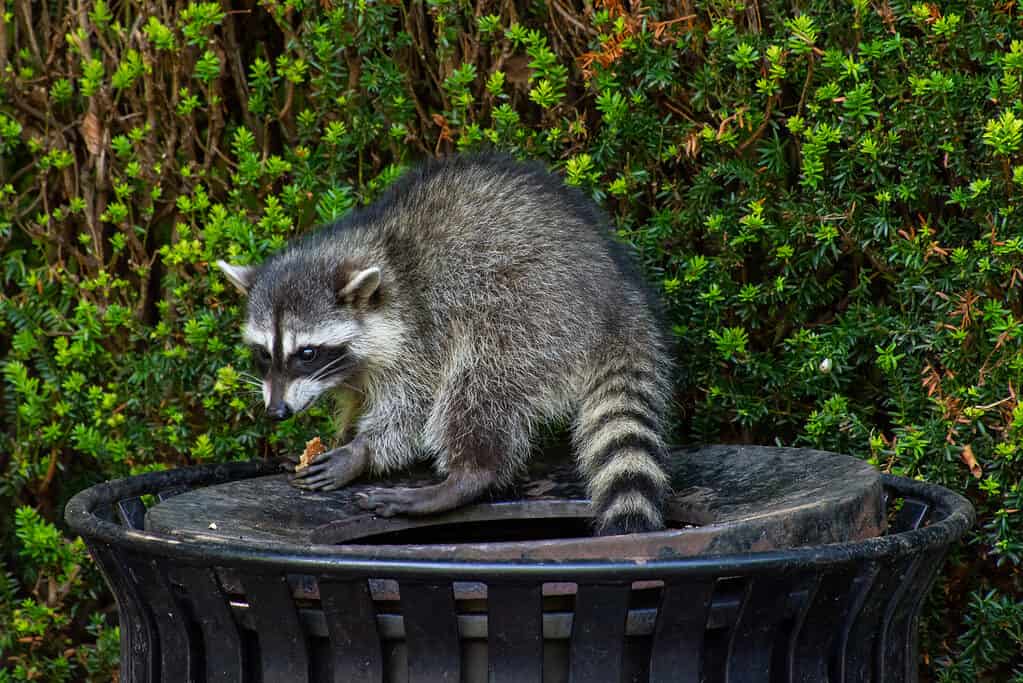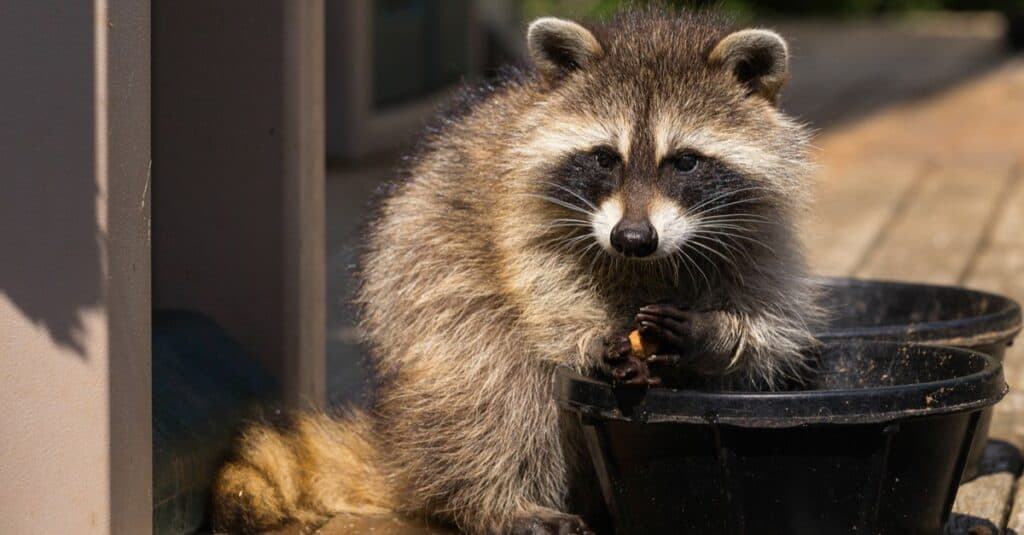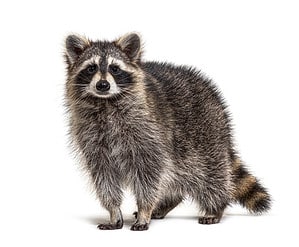You can recognize those little bandit eyes anywhere. You might even find them cute! But raccoons can pose a threat and become a nuisance. Learn four proven and effective ways to repel and deter raccoons, including what steps you can take to secure trash bins and food sources and what repellents you can use.
Understanding the Need to Repel and Deter Raccoons
Although wildlife is typically better off left alone, repelling and deterring raccoons from your property may become a necessity. Raccoons carry a range of diseases, some of which are zoonotic (they can be transferred to humans). A scratch or bite could contaminate you or your pets as could contaminated water on your property.
Not only are diseases a cause for concern, but raccoons can be quite destructive. They can get through insulation and even tear through your roofing when they’re looking for a place to take shelter. They can also make a mess outdoors by your trash cans, leaving a trail of litter in the area. They can wreck your garden and, in the process, end up attracting other pests. It’s not hard for raccoons to quickly become a nuisance.

Raccoons are opportunistic, using the cover of nightfall to find food sources.
©iStock.com/eddtoro
Raccoons are also opportunistic and if you have small pets, they could try to attack them. If they’re not native to your environment, they are likely to become invasive, which means they start to upset the ecosystem. Either they affect the population of native species by preying on them, or they compete with other native species for resources.
Securing Trash and Food Sources: Tips to Prevent Raccoon Attraction
Securing your trash and food sources doesn’t just prevent raccoons from finding your environment attractive, but it also keeps other unwelcome pests away. Before you take out the trash, double-bag it. This minimizes odors that would attract raccoons. Once it’s inside the trash bin, secure your trash bin. Remember that raccoons work with dexterous paws, so they can get into unsecured garbage cans with ease.
You might even try investing in wildlife-resistant trash bins that are designed specifically to keep wildlife away from your trash. Another way to prevent your trash from getting scattered by a hungry raccoon is to keep the whole bin clean regularly. Odors can build up inside trash bins, which only makes them more attractive to raccoons. If you can keep your trash bins locked in a shed or storage room, even better.

An unsecured trash bin is a buffet for a raccoon.
©kingma photos/Shutterstock.com
If you have pets, it’s best to feed them indoors. However, even if you feed outdoors, clean up after any spills and store their food indoors. If there are any fruit trees on your property, take the extra time to inspect the area around them to pick up any fallen fruit. The idea is to keep any food sources sealed neatly away from any curious and hungry raccoons in the area.
Seal Entry Points: Identifying and Closing Potential Raccoon Entryways
Raccoons are clever and persistent creatures. Before you start sealing entry points, conduct an inspection around the exterior of your home. Identify all the openings where a raccoon might enter. This can be anywhere from an unsealed chimney to a broken vent. If there’s damage to your siding or gaps in your roofing, you have a list of projects ahead of you.
When you’ve identified all the potential points of entry, get to work on them! Use caulk or an expanding foam to seal any cracks or gaps you find. Try hardware cloth to cover any openings and if you need a chimney cap, get one! Seal the bottom of your garage doors and make sure that access to your crawlspace and attic is sealed. Though many of these projects are DIY, for professional support, contact your local pest control company.

Raccoons are clever, which means you have to stay one step ahead of the game.
©AEWD/Shutterstock.com
Eliminate Shelter Options: Making Your Property Less Appealing to Raccoons
You have an idea of how to keep your outdoor space clean and seal up any entry points. But you should also consider what other places to keep secure. For instance, if you have a bird feeder, it might be nice for the birds, but it could be like a large welcome sign to a raccoon. If you love to grill outside, be sure to thoroughly clear out any food bits to keep the scents from inviting raccoons over. You may also need to trim the vegetation around your home. If it’s too lush, a raccoon can use it as a ladder to get onto your roof.
Implementing Repellents and Deterrents: Natural and Commercial Methods to Discourage Raccoon Presence
In the animal world, urine is for marking territory. The urine of a predator can keep raccoons away. You could also soak a rag in ammonia to deter them or keep it simple with motion-activated sprinklers that do the work, so you don’t have to. Netting and fencing can also help to keep these animals away from your property. There are commercial repellants you can employ; just be sure they don’t harm pets or wildlife. If you’re at a loss after trying a range of repellents and deterrents, reach out to a wildlife professional for assistance!
The photo featured at the top of this post is © Mark_Sawyer/Shutterstock.com
Thank you for reading! Have some feedback for us? Contact the AZ Animals editorial team.







